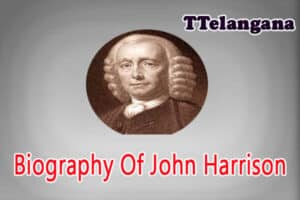Biography Of John Harrison
John Harrison, 24 March 1693 – 24, March 1776, was a watchmaker and carpenter. The marine chronometer, which allows a ship to know its longitude at sea (position with east-west access), was his invention. This was crucial in the development of long-distance maritime navigation, which was extremely important in the eighteenth century.
Short Bio John Harrison
John Harrison was born near Wakefield, West Yorkshire. John Harrison was the son of a carpenter father. John joined his father in the carpentry industry. He developed a love for music and learned how clocks worked. He would, when he was a child, take apart clocks and put them back together.
Harrison combined his skills as a carpenter and made new clocks. To improve their quality, later clocks added additional features such as the grasshopper escapement. The grasshopper escapement allowed for the release of energy in a controlled, step-by-step manner. His pendulum clocks were considered some of the best clocks of all time.
Harrison, although a great inventor, was not as skilled in dealing with people. George Graham and Edmond Halley helped Harrison to finance, encourage, and advocate for himself.
His greatest invention was the solution to the problem of longitude. It was not possible to determine a ship’s position at longitude for a long time. Many attempts were made but they failed. Safe navigation of ships requires the ability to determine longitude. Because the problem was so critical, Parliament offered a PS20,000 reward to the first person to solve it. Sir Isaac Newton himself doubted that such a device was possible.
Harrison invented a clock that could withstand fluctuations in temperature or air pressure and would keep precise time for long periods. His first sea clock, H1, took Harrison five years. It used roller pinions, a wooden wheel, and two dumbbell balances that were linked together. It was approved by the Royal Society and allowed to sail on its first route to Portugal. These tests were very favorable, with Harrison’s clock correctly predicting longitude (compared with the 60-mile-old methods). This was not enough to win the Parliamentary Prize, which required that you travel across the Atlantic.
Biography Of John Harrison

He built many versions over the years, improving the design. He changed the bar balances from circular to circular balances, which were not affected by the sea’s rolling action. The next models H2 and H3 failed to succeed, so Harrison quit his Sea Clock around 1750 and began work on a smaller watch for the sea.
Harrison created a Marine watch (H4) by incorporating elements from other watches built by Thomas Judge. Harrison proved that Longitude can be accurately measured using this watch, even though it took six more years to make. The Marine Watch was very accurate in its first test to Jamaica. The Parliament board withheld the prize, arguing it could have been due to luck. Harrison had to go through other trials and came up with H5 a second Seawatch. It proved to be reliable again, but Parliament withheld the full award. Harrison received PS8,750 after enlisting the assistance of King George III. He was now 80 years old. The full prize was not awarded to anyone.
After years of hard work, Harrison had completed his life’s work. It was quickly adopted by many people. A copy of H4 was used by Captain James Cook on his second and third trips. They proved to be very helpful for safer navigation, despite their high price.
Biography Of John Harrison
Harrison died in Hampstead at the age of 83. John Arnold improved Harrison’s device, allowing for the production of cheaper Chronometers, which were widely used in shipping.
The National Maritime Museum, Greenwich has the H1, H2, and H3 restored.
Tags: john harrison,harrison,george harrison,m. john harrison,george harrison biography documentary,biography,harrison ford,john harrison bio,m.john harrison,who was john harrison,john harrison history,gli orologi di harrison,harrison h4,harrison ford john williams,john williams harrison ford,harrison clock,john lennon geroge harrison argument,harrison ford afi,benjamin harrison,george harrison t&h,harrison watchmaker,what is life harrison